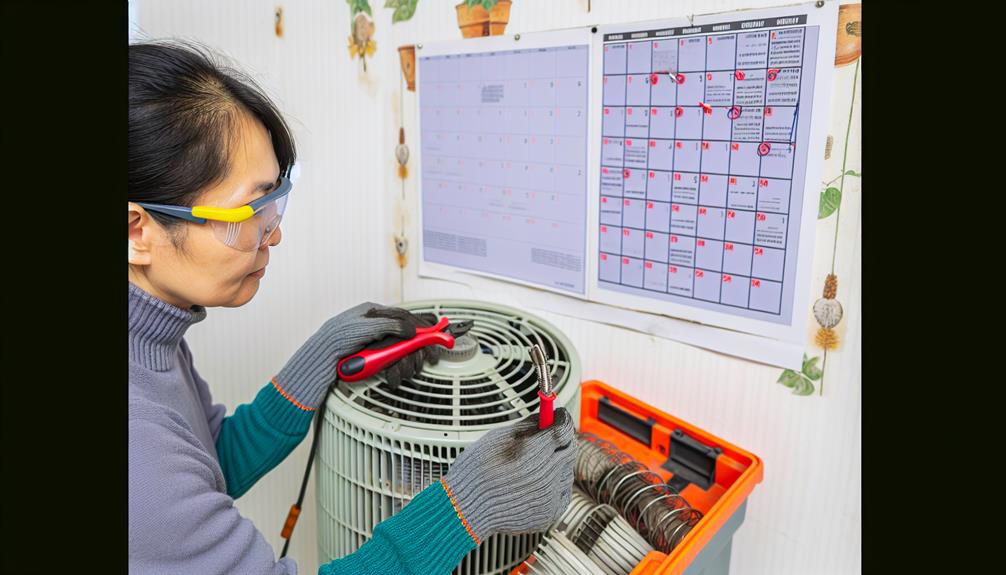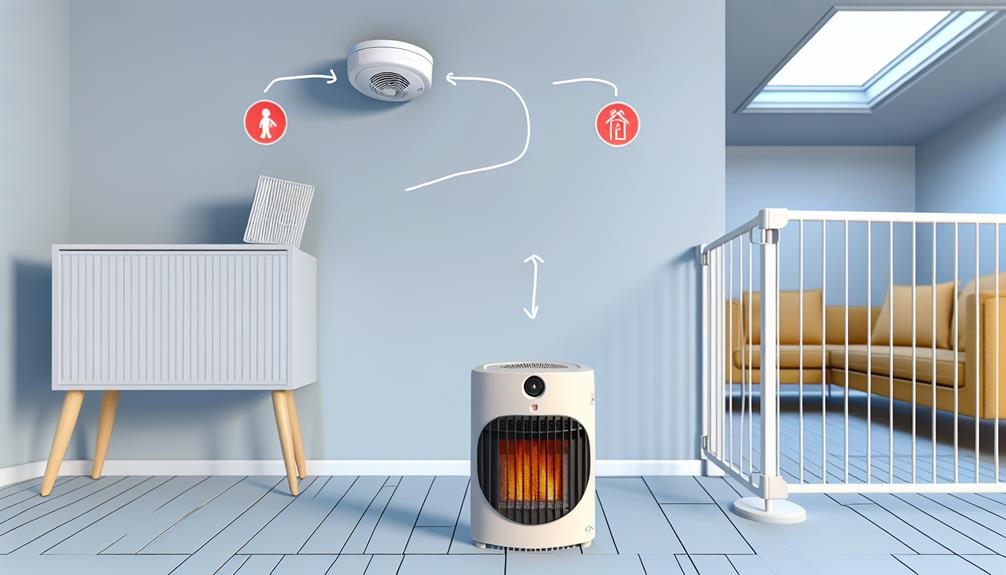As the chill of winter gently whispers through your home, you might find yourself reaching for the companionship of your portable heater. It's crucial to acknowledge the art of balancing cozy warmth with prudent energy use and safety. You've likely invested in this device to fend off the cold, but are you truly making the most of its potential? By understanding the finer points of heater placement, mastering its settings, and keeping up with maintenance, you can ensure that you're not just blowing hot air when it comes to efficiency. Let's explore the strategies that will help you get the best performance from your portable heater, keeping comfort and cost-effectiveness in perfect harmony.
Key Takeaways
- Familiarize yourself with the temperature adjustments and modes available on your portable heater.
- Take advantage of energy-saving options like timer and scheduling features to optimize energy use.
- Consider smart features such as voice control and app integration for added convenience.
- Regularly inspect and maintain your portable heater to ensure safe and efficient operation.
Optimal Heater Placement
To maximize your portable heater's efficiency and safety, it's crucial to position it on a stable, nonflammable surface away from any potential fire hazards. When using your personal space heater, it's not just about staying warm; it's also about ensuring heater safety. Establish a 3-foot safety zone free of children, pets, and flammable materials to reduce the risk of accidents. This optimal heater placement isn't just for safety — it promotes energy efficiency by allowing for an even distribution of heat.
Keep your heater at least 3 feet away from combustibles like curtains, furniture, or bedding to prevent fire hazards. Using the heater in workshops or garages where flammable substances are present is a no-go, as it significantly increases the risk of fire. Remember, safety features like Overheat Protection are beneficial, but they can't replace careful usage.
Understanding Heater Settings
Getting to know your portable heater's settings can significantly enhance your comfort while optimizing energy use. Dive into the control panel or consult the user manual to familiarize yourself with the temperature adjustments available. These settings help you regulate the heat output to match your comfort level, ensuring the space stays cozy without wasting energy.
Learn about the various modes your heater offers. Eco mode, for example, can maintain a balance between comfort and energy efficiency. Anti-frost settings prevent your pipes from freezing, and energy-saving options ensure you're not using more power than necessary. A lower wattage setting on a Convection Heater can be enough to keep a small room warm without running at full capacity.
Don't overlook the timer and scheduling features. By setting your heater to turn on just before you arrive home or off after you've fallen asleep, you'll reduce energy consumption and save on bills. Smart features can add convenience; voice control and app integration allow for remote adjustments.
Regular Maintenance Checks

While familiarizing yourself with the heater's settings can enhance its efficiency, consistent maintenance checks are crucial to ensure its longevity and safe operation. Space heaters require your attention to not just manage energy consumption but also to uphold fire safety standards. You can't overlook the importance of regular maintenance checks. These aren't just cursory glances; you need to inspect for signs of wear and tear, and clean your heater to keep it running smoothly.
Dust and debris can accumulate over time, which not only affects the performance of your Smart Electric heater but also poses a fire risk. Cleaning it regularly ensures it functions efficiently and safely. Moreover, storing your heater properly when it's out of service prevents unexpected damages that could compromise its functionality.
Keep an eye out for any faulty parts. If something seems amiss, replace it promptly. Using a damaged heater can be dangerous and may increase your energy bills. Also, ensure you're using the right accessories, like a sturdy extension cord that's in good shape. And remember, when your space heater turns the corner from efficient to defective, it's time to call in a professional for an inspection. Your vigilance with these regular maintenance checks will pay off in safety and savings.
Energy Efficiency Tips
Maximizing your portable heater's energy efficiency not only saves on electricity bills but also extends the unit's lifespan. Here are some energy efficiency tips to help you save money and reduce the cost of running your portable heater, especially during the winter months when home heating costs can skyrocket:
- Choose Wisely:
- Select a heater with lower wattage suitable for the size of your space.
- Use your heater as supplemental heat, not the primary source.
- Turn it off when the room is not in use or when you leave.
- Insulate and Seal:
- Properly insulate your home to keep the warmth in.
- Set your main thermostat lower and use the heater for targeted warmth.
- Seal drafts and use rugs to add a layer of insulation to your floors.
- Maintenance and Habits:
- Clean the heater regularly to maintain efficiency.
- Schedule professional inspections to ensure it's working correctly.
- Wear layers and use blankets to stay warm without over-relying on the heater.
Implementing these tips can make a significant difference in your comfort and your wallet. Remember, a little effort goes a long way when it comes to energy efficiency with portable heaters.
Safety Precautions & Protocols

Ensure your portable heater's safety by placing it on a stable, nonflammable surface away from any combustible materials. In your home, heating properly without compromising safety is crucial. Follow safety precautions & protocols to prevent accidents. Your heater gets hot enough to pose a risk; therefore, it's essential to situate it on the floor or securely wall mounted, ensuring it doesn't tip over.
Select a heater with built-in safety features like tip-over switches, which cut power if it falls, and overheating sensors that shut it off when it gets too hot. Look for a safety certification label from a reputable organization to confirm these features are without breaking safety standards.
Inspect your heater regularly for damage or malfunction, and adhere to the manufacturer's guidelines. Don't leave the heater unattended, especially when sleeping or leaving the house. A timer is a practical function that can help ensure the heater turns off automatically, providing peace of mind.
Educate everyone in your household about the correct use and risks of portable heaters. By staying informed and vigilant, you'll keep your home cozy and safe.
Frequently Asked Questions
How Do I Get the Most Out of My Space Heater?
To maximize your space heater's output, follow these tips: place it strategically in your room, adjust the thermostat to a comfortable level, and use a timer to manage usage. You'll enhance energy efficiency with proper insulation and by adopting a consistent maintenance routine. Always adhere to safety tips like using devices with safety certifications. This blend of placement strategies and practical steps ensures you're warm without wasting energy or risking safety.
How Do I Maximize My Heater?
To maximize your heater, position it efficiently to enhance heat distribution. Improve your room's insulation to retain warmth. Regular maintenance ensures peak performance. Adjust the thermostat according to your needs and time your usage—only when needed. Always observe safety precautions to prevent accidents. By managing these aspects, you'll enjoy a cozy space while keeping your energy consumption in check.
Is It Cheaper to Leave Storage Heaters on All the Time?
No, it's not cheaper to leave storage heaters on all the time. You'll save more by using thermostatic controls for energy efficiency, charging off-peak, and practicing zonal heating. Ensure good insulation impact to retain heat and place your heater wisely. Don't forget a regular maintenance routine to keep it running efficiently. These steps will help you manage your heating costs better than leaving your heater on constantly.
Do Portable Heaters Run up Your Electric Bill?
Yes, portable heaters can increase your electric bill, especially if they're not energy-efficient or used excessively. To minimize costs, focus on heat retention and proper insulation interaction. Utilize zonal heating to warm only occupied spaces, and adjust your thermostat settings accordingly. Keep up with maintenance checks to ensure peak performance. Monitor your usage patterns to avoid unnecessary operation, as consistent, mindful use can help manage your energy consumption.
